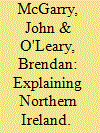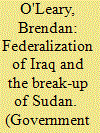| Srl | Item |
| 1 |
ID:
149242


|
|
|
|
|
| Summary/Abstract |
Northern Ireland and Scotland could and should stay within the European Union while remaining inside the United Kingdom. This proposal need not prevent, and may facilitate, England and Wales in leaving the EU, and it is in accordance with the respective preferences of the peoples of the two Unions who voted in the advisory referendum held on 23 June 2016. Prime Minister May and her Cabinet should address carefully the question of whether to trigger Article 50, or instead to give notice that only parts of the UK—England and Wales—will be leaving the EU. The price of enforcing the entirety of the UK's exit from the EU may be lasting damage to the two Unions that make up the United Kingdom of Great Britain and Northern Ireland.
|
|
|
|
|
|
|
|
|
|
|
|
|
|
|
|
| 2 |
ID:
006081


|
|
|
|
|
| Publication |
Oxford, Blackwell Publisher, 1995.
|
| Description |
viii, 533p.
|
| Standard Number |
0631183485
|
|
|
|
|
|
|
|
|
|
|
|
Copies: C:1/I:0,R:0,Q:0
Circulation
| Accession# | Call# | Current Location | Status | Policy | Location |
| 037736 | 303.609416/MCG 037736 | Main | On Shelf | General | |
|
|
|
|
| 3 |
ID:
115025


|
|
|
|
|
| Publication |
2012.
|
| Summary/Abstract |
In 2005, after the making of the Constitution of Iraq and the making of Sudan's Comprehensive Peace Agreement, many analysts expected the imminent break-up of Iraq, and that the South Sudanese would eventually opt for federalism and power-sharing rather than secede from Sudan. Six remarkable parallels in the histories of Iraq and Sudan suggest that analysts should have predicted that the Kurds and the South Sudanese would have been equally ardent secessionists in the early twenty-first century. Yet Kurdish nationalist leaders chose federalization in and after 2005, whereas South Sudanese nationalists eventually chose secession after a brief federal power-sharing experiment. The different choices of the respective nationalist leaders were therefore critical, but some plausible explanations of their different choices do not withstand scrutiny. The differing outcomes, so far, are necessarily but not sufficiently explained by the different geopolitical neighbourhoods of Iraq and Sudan. The author suggests that secessions are also driven by political parties who are willing to downsize their state rather than modify the existing regime, and by nationalists who calculate that they are unlikely to have political pivotality in a federal democracy. One implication is that federal power-sharing bargains have a better chance of working in deeply divided places when potential secessionists believe that they may have political pivotality within a federation.
|
|
|
|
|
|
|
|
|
|
|
|
|
|
|
|
| 4 |
ID:
052994


|
|
|
|
|
| Publication |
Jul-Sep 2004.
|
|
|
|
|
|
|
|
|
|
|
|
|
|
|
|